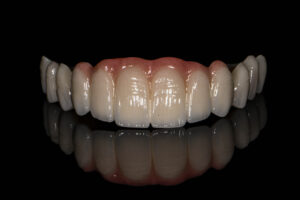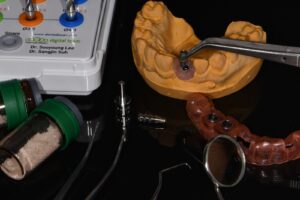Tooth loss is a common oral health problem that can result from tooth decay, gum disease, dental trauma, or autoimmune conditions. Its impact extends beyond oral health, affecting both appearance and overall quality of life. Left untreated, it may lead to difficulty chewing, inadequate nutrition, and problems with self-esteem. Thankfully, dental professionals can offer a range of solutions to restore lost teeth, such as dental implants and bridges.
What Are Dental Bridges?

Dental bridges are a form of dental restoration used to fill the gap or space between two healthy teeth in case one or more teeth are missing. They typically consist of two or more crowns for the teeth on either side of the gap (abutment teeth) and a false tooth in between. False or artificial teeth, known as pontics, can be made from various materials, such as porcelain, gold, alloys, or combinations.
What Are the Benefits of Dental Bridges?
Dental bridges offer a comprehensive solution for tooth loss. They can help address both functional and aesthetic concerns of individuals experiencing tooth loss.
- Restoring Smile – Fixed bridges are designed to fill the gap left by the missing teeth, restoring a seamless and natural-looking smile. They are customized to match the color, shape, and size of the surrounding teeth, ensuring a cohesive and aesthetically pleasing dental restoration.
- Enhanced Chewing Comfort – Tooth loss can make eating uncomfortable and painful when the adjacent teeth shift towards the open space. Additionally, food particles can accumulate in the empty socket. Dental fixed bridges can make chewing more comfortable by filling gaps between teeth to restore dental arch function.
- Improved Speaking – Missing teeth can affect speech, causing pronunciation difficulties or lisping. Dental bridges can help address these issues by bridging the gaps and restoring the proper alignment and spacing of the teeth.
- Preservation of Facial Structure – The roots of the teeth are crucial for stimulating the bone cells in the jaw. Without this stimulation, it can lead to severe jawbone deterioration, further tooth loss, and facial collapse. Dental fixed bridges support the natural contours of the face and maintain its alignment.
- Prevention of Teeth Shifting – When a tooth is lost, the adjacent teeth may shift or tilt into the open space. This causes misalignment and oral complications like tooth decay, bite changes, and gum disease. Dental bridges prevent this shifting by filling the gap and providing stability to the surrounding teeth.
What Are Dental Implants?

Dental implants are titanium posts surgically implanted into the jawbone to provide support for a replacement tooth or bridge. These implants replicate the entire structure of a natural tooth, from the root to the crown. Over time, they fuse with the natural bone in the jaw to prevent bone loss and provide a stable foundation for replacement teeth.
What Are the Benefits of Dental Implants?
Dental implants are often the preferred method of replacing missing or damaged teeth because of their numerous benefits. These include:
- Natural Look and Feel – A dental implant closely resembles natural teeth, making chewing more comfortable compared to traditional dentures or bridges. It can also help preserve speech patterns by filling in gaps between teeth that could otherwise change airflow through the mouth during speech.
- Longevity and Durability – Dental implants can last a lifetime with proper care and maintenance. The implant is constructed from titanium, a biocompatible material with excellent wear and decay resistance.
- Preservation of Jawbone Health – A tooth loss may result in the weakening of the jawbone underneath. Dental implants can fuse with the jawbone through osseointegration. This process provides the necessary stimulation for natural bone growth to prevent bone loss and bone resorption, such as changes in facial structure.
- Keeping the Adjacent Teeth Stable – A gap from a missing tooth can cause the adjacent teeth to crookedly shift towards the gap, leading to misalignment and biting and chewing issues. Dental implants can fill the space between the teeth and maintain the health of the surrounding teeth by preventing them from shifting out of place.
- Minimizing Gum Disease – A gap left by a missing tooth can become a breeding ground for food particles and bacteria, leading to gum inflammation and potential complications. Dental implants prevent gum inflammation by securely integrating into the jawbone, making them easier to clean than other tooth replacements.
Key Considerations When Choosing Between Dental Implants and Bridges
When deciding between dental implants and fixed bridges, it is important to consider various factors, such as:
- Number of Missing Teeth – The number of missing teeth is a key factor in deciding on the most appropriate treatment. Dental bridges are typically recommended for people with one or a few missing teeth. On the other hand, dental implants are a more suitable option for individuals with multiple missing teeth or, in certain instances, a full arch of lost teeth.
- Adjacent Teeth’s Health – Dental bridges require using adjacent healthy teeth as support. If adjacent teeth are weak or compromised, dental implants may be a more suitable alternative. They are standalone structures that do not require adjacent teeth to be shaved.
- Longevity – Dental implants typically last for a lifetime, whereas dental bridges generally last for 5–20 years. For instance, tooth decay can damage the tooth that holds the bridgework. However, implants are made from a biocompatible material resistant to decay.
- Surgery vs. No Surgery – Dental implants involve a surgical procedure for placement, while dental bridges offer a non-surgical option. Dental bridges are more suitable for those who prefer not to undergo surgery or are not fit for surgery due to certain medical conditions.
- Treatment Time – A dental implant requires a longer treatment time spanning over six months, as it involves multiple procedures such as extraction, bone grafting, sinus lift, and implant placement. On the other hand, dental bridges only require two to three dental visits over a few weeks.
- Homecare Maintenance – Both dental implants and bridges require regular oral hygiene practices. While a fixed bridge involves using a floss threader, dental implants are easier to clean and maintain as they can be brushed and flossed like natural teeth.
- Cost-Effectiveness – Dental implants are typically more expensive than dental bridges. However, considering their longevity and potential for long-term oral health benefits, they may be a cost-effective option in the long run.
- Overall Health of the Patient – Dental implants involve a surgical procedure, which may affect the suitability of individuals with medical conditions that hinder healing, such as diabetes or leukemia. The ideal candidates for dental implants are in good general health and have a healthy jawbone free of decay.
In conclusion, dental implants and bridges are both effective options for restoring your smile after tooth loss. If you prioritize natural appearance and durability, implants are the optimal solution. On the other hand, bridges offer similar results at a lower initial cost but may require more long-term maintenance due to their reliance on surrounding teeth for support. Consulting a dental professional can help determine the right treatment for your specific case.
If you are seeking dental care for tooth loss, Apostol Dental Cosmetic Center is here to assist. Located in Makati, Philippines, we provide quality dental care services that cater to the unique needs of every patient. With a track record dating from 2010, we specialize in various tooth replacement procedures, including dental implants and fixed bridges. For more details or to book an appointment, contact us at 0917-8724929 or send us an email at admin@apostoldental.com.
Dental Clinic in Makati | Meet Our Doctor

Dr. Jonas John Apostol, MSc
Cosmetic and Restorative Dentistry
- Masters in Esthetic Dentistry, Goethe University, Frankfurt, Germany
- Biomimetic Mastership, Alleman Center of Biomimetic Dentistry
- Member of the American Academy of Cosmetic Dentistry (AACD)
- Services include Veneers, General Dentistry, Dentures, Dental Fixed Bridges, Dental Implants, Root Canal treatment, Orthodontics or Braces, Oral Surgery, TMJ treatment, Periodontics and Cosmetic Dentistry
- Specializing in Dental Cosmetic Services


